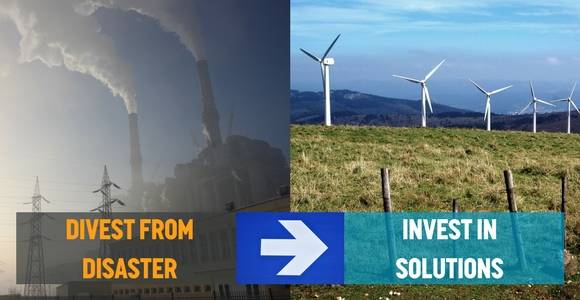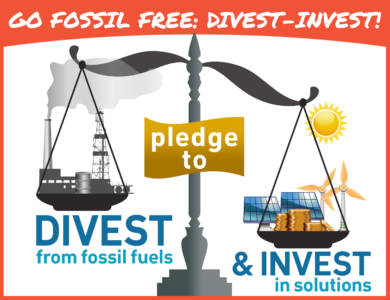By Nicole Conlan
A major pillar of 350 Colorado’s sustainability strategy is fossil fuel divestment (or as it is often called, Divest-Invest). But if you’re not a financial expert, you might not know what that entails. This piece covers both investment and pension funds as well as day-to-day banking, and how you can make sure your money isn’t funding fossil fuel companies.
What Is Divestment?
DI-vestment is the opposite of IN-vestment. The definition of investment is “putting money, effort, time, etc. into something to make a profit.” In simpler terms, you make an investment when you give your money to someone in the hopes of making more money in the long run. That might look like giving a business money to cover its startup costs in exchange for a portion of the profits.
Investing is a very popular and reliable strategy for growing wealth, and it’s used both by individuals and institutions. In cases like retirement and pension funds, your employer, union, or financial institution invests your money along with their other members, which helps everyone grow their retirement funds.
Divestment occurs when investors like you purposely remove their money from companies or industries, and it can be motivated by a variety of factors, including personal ethics. If you don’t support fossil fuels, why would you put your money in them? Divestment is a powerful tool for ending our relationship with fossil fuels. It’s effective not only because it starves the industry of the capital it needs to operate, but also because it sends a signal to other businesses that associating with fossil fuels could lose them money. As fossil fuels become less profitable and more socially stigmatized, the industry will stop expanding and eventually shrink.
Divestment also makes financial sense for investors. The transition to renewable energy is inevitable, which means keeping your money invested in fossil fuels will ultimately be a losing proposition. One of the benefits of divesting from fossil fuels is that it frees your money up to invest in technology you do support, like renewable energy,

What About Regular Banking?
Even if you haven’t built an investment portfolio, your money might still be going towards fossil fuel interests. Nearly all major banks loan money to fossil fuel companies to expand their existing infrastructure for both extracting and burning fossil fuels. In 2021 alone, the “world’s top banks pumped $742 bln into fossil fuels in 2021.” The banks who contributed the most money to fossil fuel expansion were JP Morgan Chase, Citi, Wells Fargo, and Bank of America, but banks of all sizes have given money to fossil fuel interests. If you’re not sure if your bank has oil on their hands, you can look up their annual report or call to ask them. We recommend local credit unions as a healthy alternative to the mainstream Wall Street Banks. Just be sure to ask about investment priorities and fossil fuels.
How To Divest
For some people, divestment is as simple as identifying which stocks in your portfolio are fossil fuels and selling them. However, most of us have investments tied up in mutual funds or managed by another entity, such as a financial advisor or pension manager. In this case, you should contact whoever is managing your funds and request to go fossil-fuel free. Many financial institutions don’t offer fossil-fuel free investment portfolios. If your financial institution is unable to remove individual stocks from their portfolios, tell them you’re considering divestment, and that if their services are unable to accommodate this request, you’ll have to find another financial provider who can.
If they won’t budge, the next step is closing your account with your financial provider. Make sure to tell them it’s because you want a more sustainable investment strategy, so they know their fossil fuel investments are hurting their business.
If you bank at one of the major institutions that funds climate change, like JP Morgan Chase or Wells Fargo, close your accounts there, and tell them it’s because of their financial support of the fossil fuel industry. We recommend local credit unions as an alternative.
If your investments are managed by another organization like a pension fund through your job, school, or religious institution, you can take the following steps to encourage them to divest from fossil fuels:
- Find out who to speak with about your pension fund. You can ask your employer, union rep, or similar point of contact who manages the fund.
- Determine if your pension fund is invested in fossil fuels. You can look at your institution’s annual report, or if it’s not clear, reach out to the person you found in Step 1.
- If you learn that your money is invested in fossil fuels, send a letter to the fund manager or Trustee. If you’d like guidance on what to say, The Guardian provided an excellent template here. If they don’t currently have a fossil fuel free option, ask when there will be one (and be aware that if they offer an “ethical” portfolio, that might not mean fossil fuel free!).
- If you are a Colorado PERA member, we have an ongoing campaign calling on them to divest from fossil fuels. Contact the PERA Board and tell them you support divestment and a fossil free option in the meantime. You can contact PERA at: board@copera.org
- You’ll probably get some pushback from your pension manager. Come prepared with responses to the likely arguments they’ll make for not switching your pension away from fossil fuels.
Now, It’s Time To Re-Invest
 Removing your money from fossil fuel investments is a huge part of the solution, but it’s enhanced when you take your money and re-investment in sustainable funds. As with divestment, you can either pick sustainable stocks individually, or your financial institution can guide you. Many financial institutions now offer sustainable portfolios, which give you the ease of a professionally managed investment with the peace of mind that your money isn’t going to Big Oil. But remember – just because they have an “ethical” portfolio doesn’t mean it’s fossil fuel free. Do your homework and ask questions to determine if your money will be used to expand fossil fuel extraction and use.
Removing your money from fossil fuel investments is a huge part of the solution, but it’s enhanced when you take your money and re-investment in sustainable funds. As with divestment, you can either pick sustainable stocks individually, or your financial institution can guide you. Many financial institutions now offer sustainable portfolios, which give you the ease of a professionally managed investment with the peace of mind that your money isn’t going to Big Oil. But remember – just because they have an “ethical” portfolio doesn’t mean it’s fossil fuel free. Do your homework and ask questions to determine if your money will be used to expand fossil fuel extraction and use.
If you’d prefer to let someone else manage your money, there are plenty of climate-forward wealth management firms who can offer you excellent financial services while keeping your money out of the hands of polluters. They can offer financial advice to both individuals and institutions.
You can use this tool to find a better option for your regular bank. Many of these banks and credit unions also offer financial services for anyone looking to start an investment portfolio.
How to Take Action:
- Sign the Go Fossil Free Divest-Invest Pledge and learn more about immediate steps you can take to divest from fossil fuels and reinvest in solutions.
- Break ties with and boycott banks financing harmful projects. Select a financial institution that is not financing fossil fuel projects and infrastructure, such as tar sands oil, fracking, coal mining, and oil or natural gas pipelines. Credit Unions are a great place to start.
- Support Public Banking! 350 Colorado, as part of the Colorado Public Banking Coalition, is continuing to call on Colorado Legislators to support legislation to establish a Colorado public bank and allow municipal governments to establish public banks. Sign on to our support letter here!
Want to get more involved? Join 350 CO’s Defund Climate Disaster/Divest-Invest Committee to receive ongoing action alerts and stay up to date with campaign planning.
More Resources
If you’d like to learn more about how your money is funding fossil fuels – and how you can make sure it doesn’t – we’ve assembled this list of resources. They don’t make it easy to get your money out, but in the end, it’s worth it.
